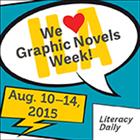 The ever-expanding genre of the graphic novel contains fiction, biography, science, history, historical fiction, science fiction, fantasy, and more. Listed below are some new titles for 2015 in the graphic novel realm. Reading the art as well as the text combines to make these stories a visual experience that sometimes can be very literal or, at other times, leave room for interpretation.
The ever-expanding genre of the graphic novel contains fiction, biography, science, history, historical fiction, science fiction, fantasy, and more. Listed below are some new titles for 2015 in the graphic novel realm. Reading the art as well as the text combines to make these stories a visual experience that sometimes can be very literal or, at other times, leave room for interpretation.
Ages 4–8
The Misadventures of Salem Hyde: Book Four: Dinosaur Dilemma. Frank Cammuso. 2015. Amulet.
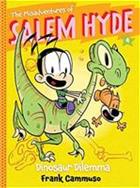 Young witch Salem Hyde gets an idea for her science project after a field trip to the Natural History Museum. Disappointed that the dinosaurs aren’t alive and real, she uses her magic to bring them to life. After a few disastrous moments escaping a T-Rex and other large reptiles, she “accidentally” brings home a real dinosaur egg that hatches the next morning. As the little critter begins to eat and grow rapidly, the real trouble begins.
Young witch Salem Hyde gets an idea for her science project after a field trip to the Natural History Museum. Disappointed that the dinosaurs aren’t alive and real, she uses her magic to bring them to life. After a few disastrous moments escaping a T-Rex and other large reptiles, she “accidentally” brings home a real dinosaur egg that hatches the next morning. As the little critter begins to eat and grow rapidly, the real trouble begins.
Sleepless Knight. James Sturm. 2015. First Second.
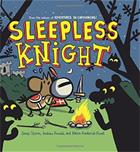 Perfect for the preschool crowd, this introduction to graphic novels features a young Knight embarking on his first camping adventure. He cannot fall asleep. He realizes his Teddy is missing, thus causing the insomnia. Leaving his tent, he searches for Teddy. A few forest animals offer help, and when Teddy is found, the forest animals are now wide awake. The endpapers give instructions on how to draw the characters featured in the story.
Perfect for the preschool crowd, this introduction to graphic novels features a young Knight embarking on his first camping adventure. He cannot fall asleep. He realizes his Teddy is missing, thus causing the insomnia. Leaving his tent, he searches for Teddy. A few forest animals offer help, and when Teddy is found, the forest animals are now wide awake. The endpapers give instructions on how to draw the characters featured in the story.
Ages 9–11
Lumberjanes: Book One: Beware the Kitten Holy. Noelle Stevenson and Grace Ellis. Ill. Brooke Allen. 2015. BOOM!/Boom Entertainment.
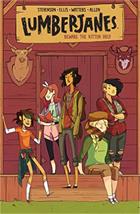 Jo, April, Mal, Molly, and Ripley are five kick-butt best friends attending summer camp for Hard-Core Ladies. Their supernatural camp adventure begins when they witness a woman transforming into a bear. Other escapades include a three-eyed fox and a confrontation with some yetis. With several subtle nods to female social activists, the feminist cast of characters, each with a special quality, embarks on several quests to conquer all kinds of difficulties and bizarre creatures. (Originally published in single magazine comic book form, numbers 1–4)
Jo, April, Mal, Molly, and Ripley are five kick-butt best friends attending summer camp for Hard-Core Ladies. Their supernatural camp adventure begins when they witness a woman transforming into a bear. Other escapades include a three-eyed fox and a confrontation with some yetis. With several subtle nods to female social activists, the feminist cast of characters, each with a special quality, embarks on several quests to conquer all kinds of difficulties and bizarre creatures. (Originally published in single magazine comic book form, numbers 1–4)
The Lunch Witch. Deb Lucke. 2015. Papercutz.
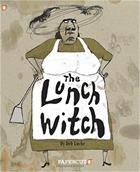 When Grunhilda Blackheart loses her witchy job at the Salem Museum for not being scary enough, she has to look for new employment. Knowing that her ancestors are probably ashamed of her, she forges ahead with the job hunting and ends up as a cafeteria lady. Handing out curdled milk is perfect for her until she befriends a young student who is failing all her classes. Grunhilda creates a smartness potion to give her friend an academic edge. The food scraps and grease spots and oil stains that decorate each page against a background of greens and browns are the perfect backdrop for the witch Grunhilda as she begins a new career in food service.
When Grunhilda Blackheart loses her witchy job at the Salem Museum for not being scary enough, she has to look for new employment. Knowing that her ancestors are probably ashamed of her, she forges ahead with the job hunting and ends up as a cafeteria lady. Handing out curdled milk is perfect for her until she befriends a young student who is failing all her classes. Grunhilda creates a smartness potion to give her friend an academic edge. The food scraps and grease spots and oil stains that decorate each page against a background of greens and browns are the perfect backdrop for the witch Grunhilda as she begins a new career in food service.
Stinky Cecil in Operation Pond Rescue. Paige Braddock. 2015. Andrews McMeel.
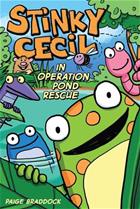 Cecil the toad and his other amphibian friends like to hang out at the pond and have contests and other water fun splashing around. When Cecil takes note of the construction of a new highway that appears to be coming their way, he alerts his friends and they develop a plan to halt the destruction of their home.
Cecil the toad and his other amphibian friends like to hang out at the pond and have contests and other water fun splashing around. When Cecil takes note of the construction of a new highway that appears to be coming their way, he alerts his friends and they develop a plan to halt the destruction of their home.
Filled with hilarious dialogue but also actual facts about the destruction of habitats and ecosystems this graphic novel is actually a look at an environmental problem facing wetlands today.
The Underground Abductor. Nathan Hale. 2015. Amulet.
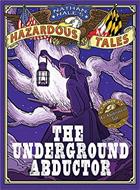 Beginning with maps on the endpapers, this next installment of Nathan Hale’s Hazardous Tales series peeks at American History as seen through the genre of the graphic novel, taking readers to the Underground Railroad movement of Harriet Tubman. Born a slave in Delaware named Araminta Ross, this graphic novel tells the story of how she changed her name to Harriet Tubman and escaped to freedom. Not satisfied with her own free state, Harriet travels back into slave territory to lead other slaves to safety and freedom along the route of the Underground Railroad. Visit the author’s blogspot where book trailers, videos, and chats with the author about historical writing and graphic novels can be found.
Beginning with maps on the endpapers, this next installment of Nathan Hale’s Hazardous Tales series peeks at American History as seen through the genre of the graphic novel, taking readers to the Underground Railroad movement of Harriet Tubman. Born a slave in Delaware named Araminta Ross, this graphic novel tells the story of how she changed her name to Harriet Tubman and escaped to freedom. Not satisfied with her own free state, Harriet travels back into slave territory to lead other slaves to safety and freedom along the route of the Underground Railroad. Visit the author’s blogspot where book trailers, videos, and chats with the author about historical writing and graphic novels can be found.
Ages 12–14
Ares: Bringer of War: Olympians 7. George O’Connor. 2015. First Second.
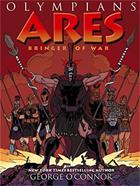 Using Homer’s “The Iliad” as the basis for this graphic novel, the warring life of Ares comes to life in this graphic novel. Illustrated with blood-red backgrounds that are certainly representational of great battlefields, readers are spared from the actual gore of sword-drawn confrontations. The Trojan War and the wrath of Zeus are on display here as Ares does battle with his father and the other gods of Olympus. This is the seventh graphic novel in the series The Olympians, with 12 volumes planned in all. The publisher and author have created a website for the series that includes readers’ guides and activities for each book in the series.
Using Homer’s “The Iliad” as the basis for this graphic novel, the warring life of Ares comes to life in this graphic novel. Illustrated with blood-red backgrounds that are certainly representational of great battlefields, readers are spared from the actual gore of sword-drawn confrontations. The Trojan War and the wrath of Zeus are on display here as Ares does battle with his father and the other gods of Olympus. This is the seventh graphic novel in the series The Olympians, with 12 volumes planned in all. The publisher and author have created a website for the series that includes readers’ guides and activities for each book in the series.
Lost in NYC: A Subway Adventure. Nadja Spiegelman. 2015. TOON.
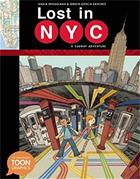 Pablo is new to the city, and on his first day of school he finds himself going on a field trip to the Empire State Building. Paired with Alicia as his partner, they soon become separated from the rest of the class at 96th Street. Venturing onto the subway, they attempt to catch up with the group only to become separated from each other. Pablo is on his own but explores other trains heading to the famous building. A history of New York and transportation offers background material that includes actual pictures of the subway maps. Teachers should check out this CCSS Lesson Plan and Teacher’s Guide to accompany the book. A Spanish version entitled Perdidos in NYC: Una Aventura en el Metro is also available.
Pablo is new to the city, and on his first day of school he finds himself going on a field trip to the Empire State Building. Paired with Alicia as his partner, they soon become separated from the rest of the class at 96th Street. Venturing onto the subway, they attempt to catch up with the group only to become separated from each other. Pablo is on his own but explores other trains heading to the famous building. A history of New York and transportation offers background material that includes actual pictures of the subway maps. Teachers should check out this CCSS Lesson Plan and Teacher’s Guide to accompany the book. A Spanish version entitled Perdidos in NYC: Una Aventura en el Metro is also available.
Ages 15+
March: Book 2. John Lewis. 2015. Top Shelf.
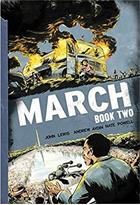 Book 2 in a planned trilogy, John Lewis continues the story of the Civil Rights movement from the 1960s in his books, March. Lewis talks about his involvement in sit-ins and the freedom rides and being chairman of the Student Nonviolent Coordinating Committee. The graphic illustrations create a vivid visual to add to the information about this turbulent time. This book is based on the experiences of U.S. Congressman John Lewis from Georgia, who was inspired to write this story and who chose the graphic novel format after reading a graphic novel about Martin Luther King, Jr. Teachers might enjoy showing an interview with Jon Lewis on The Daily Show.
Book 2 in a planned trilogy, John Lewis continues the story of the Civil Rights movement from the 1960s in his books, March. Lewis talks about his involvement in sit-ins and the freedom rides and being chairman of the Student Nonviolent Coordinating Committee. The graphic illustrations create a vivid visual to add to the information about this turbulent time. This book is based on the experiences of U.S. Congressman John Lewis from Georgia, who was inspired to write this story and who chose the graphic novel format after reading a graphic novel about Martin Luther King, Jr. Teachers might enjoy showing an interview with Jon Lewis on The Daily Show.
Nimona. Noelle Stevenson. 2015. HarperTeen/HarperCollins.
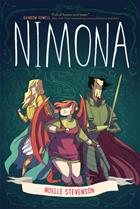 Based on the author’s critically acclaimed web comic, this debut graphic novel is receiving starred reviews from many major review sources. Nimona is the mysterious sidekick to the newly acclaimed supervillain, Lord Ballister Blackheart. Blackheart is set on a vendetta against his former best friend Sir Ambrose Goldenloin, who now heads up The Institute of Law Enforcement. However, this institute may not be as virtuous as Goldenloin would have people believe. Shape-shifting Nimona adds vehemence to her partnership with Blackheart. A vivid use of contrasting colors for the main characters and lively dialogue enhance this action-packed story.
Based on the author’s critically acclaimed web comic, this debut graphic novel is receiving starred reviews from many major review sources. Nimona is the mysterious sidekick to the newly acclaimed supervillain, Lord Ballister Blackheart. Blackheart is set on a vendetta against his former best friend Sir Ambrose Goldenloin, who now heads up The Institute of Law Enforcement. However, this institute may not be as virtuous as Goldenloin would have people believe. Shape-shifting Nimona adds vehemence to her partnership with Blackheart. A vivid use of contrasting colors for the main characters and lively dialogue enhance this action-packed story.
Yo, Miss. A Graphic Look at High School. Lisa Wilde. 2015. Microcosm.
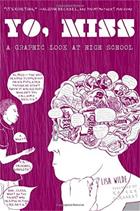 This nonfiction graphic novel (oxymoron?) is a book for teachers as well as high school students, and is based on the teaching experiences of the author at John V. Lindsay Wildcat Academy and the seniors she taught at this second-chance high school. These semiautobiographical portraits present eight students who have been expelled from previous schools and are considered at risk. From her 16 years of teaching here, Wilde reveals the inner thoughts and experiences of these kids who are trying to escape gangs, who are pregnant, who put on a false bravado about life and failing, to the hope that could possibly be on the horizon. For readers who enjoyed The Freedom Writers Diary (Erin Gruelle, 1999) or My Posse Don’t Do Homework (LouAnne Johnson, 1992), Yo, Miss adds the visual dimension to these stories of seriously struggling students in school today.
This nonfiction graphic novel (oxymoron?) is a book for teachers as well as high school students, and is based on the teaching experiences of the author at John V. Lindsay Wildcat Academy and the seniors she taught at this second-chance high school. These semiautobiographical portraits present eight students who have been expelled from previous schools and are considered at risk. From her 16 years of teaching here, Wilde reveals the inner thoughts and experiences of these kids who are trying to escape gangs, who are pregnant, who put on a false bravado about life and failing, to the hope that could possibly be on the horizon. For readers who enjoyed The Freedom Writers Diary (Erin Gruelle, 1999) or My Posse Don’t Do Homework (LouAnne Johnson, 1992), Yo, Miss adds the visual dimension to these stories of seriously struggling students in school today.
Karen Hildebrand is retired library media specialist and library director for Delaware City Schools in Delaware, OH. She is currently an adjunct professor at Ashland University in Ohio, a reading consultant, and a Holocaust Fellow at the United States Holocaust Memorial Museum in Washington, DC. She also chairs the Education Curriculum Committee for the Delaware County Historical Society. The review contributions are provided by members of the International Literacy Association’s Children’s Literature and Reading Special Interest Group.